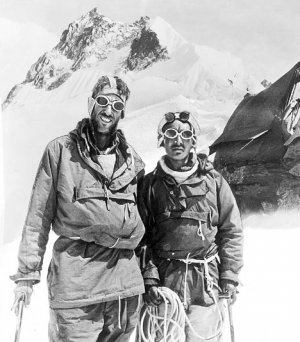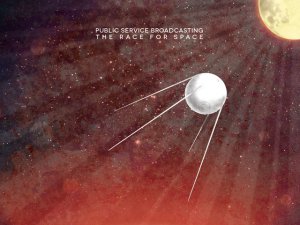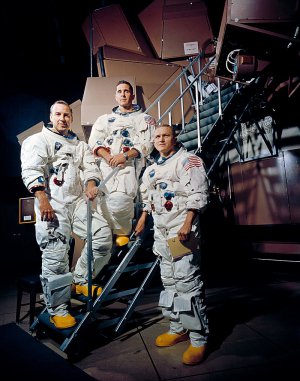Graham Reid | | 13 min read
Public Service Broadcasting: Fire in the Cockpit

I know this is very wrong, but while talking to J. Willgoose – not his real name – who is the taller half of Britain's Public Service Broadcasting, I am picturing him as like the actor/writer Stephen Merchant.
He has the same dry humour and delivery. And he's tall, with glasses.
Willgoose and Wrigglesworth as PSB have created some of the most interesting music-cum-film concepts in the past five years when, as they trawl the archives of the British Film Institute and American film archives, they bring out historical moments in visual and sound samples, marring them to music from keyboards, synths and banjo.
Or vice-versa. It's a complex and integrated process where music and source ideas feed of each.
Their album Inform-Educate-Entertain (one of Elsewhere's Best of 2013 albums) was perfectly titled: they engaged with the excitement of progress and science on pieces which referred to the night mail trains, Spitfires and the conquest of Everest. Their sources seem to come from ages of optimism that progress, science and heroism could save us from whatever fate awaited.
Their earlier EP The War Room focused on the Second World War and their forthcoming album is The Race for Space (released Feb 23) and connects with the remarkable decade from the late Fifties when Mankind reached for the stars and moon.
But PSB also bring a light touch, the track Gagarin is a silly slice of dance-funk and,as Willgoose explains, there's a reason for that.
They play the 2015 Taranaki Womad and are bringing their films with them. Should be quite an event, especially in the country where the conqueror of Everest came from . . .
 Hello Mr Willgoose, may I call you Mr
J?
Hello Mr Willgoose, may I call you Mr
J?
That's fine by me. (Laughs)
First of all Mr J, why do you choose to use pseudonyms, is this the Daft Punk manoeuvre?
Pseudonyms? Pseudonyms? I have never been so offended, I don't know how you can possibly suggest such a thing. (laughs) We like to keep an air of mystery about some things. It's nice to have an air of enigma washing around and that's one of the ways we do it.
I understand that, people these days seem to think they are entitled to know everything about anyone in public life. I like the air of mystery and because of it there's a heightened enhancement about what you do. I very much like what you do and have an advance copy of the new album so would like to talk specifically about that because it does represent a change of focus.
But first of all when I look at your touring schedule I see you have a number of dates in the US coming. Have you been to the States much, and if so how have you have been received?
We went there earlier this year for about three and half weeks, including a week at South x South West. It went well but at a very, very modest level. In such a massive country you may as well go for a few weeks, and also if you are expecting to happen, any modest success, it is going to take a while, a few repeat visits. Because that's exactly what happened at home. Nothing happened overnight.
It seems that English people in the UK are always a bit worried that some of the humour or funnier elements of what we do wouldn't come across to Americans, because we tend to give Americans quite a hard time in terms of 'getting us'. But they responded in the way we hoped, so the signs are quite positive really.
 It stuck me though that the Inform
album is very English.
It stuck me though that the Inform
album is very English.
Yeah, but the weird thing was it used some famous American public service things at the same time. I think it's mainly in the way we present ourselves, the slightly bashful way, we're not particularly charismatic people and maybe that gives us our self-deprecating humour and manner.
I was thinking about things like the use of Night Mail and Spitfire. First of all these things are very long gone, even for someone of your age so I'm wondering how Americans could begin to understand the depths of those British icons. Or am I underestimating them?
I think you've got the music and the music is is going to much of the work for you and you don't even have to speak the same language for that to come across. So there is that element and in terms of the subject matter it might be an advantage because they are not as up to speed as people over here might be, they come at it with curiosity.
 And you have the images to go with the
music.
And you have the images to go with the
music.
Yeah, being able to show those is good. In the early days of course we didn't have them so it was purely a musical presentation that we played live. But gradually that has has become an integral part of the set and definitely helps communicate a lot of the subject matter which might otherwise get lost.
Just with regard to those images, was it easy to get permission to use them?
Broadly speaking the people we've been lucky enough to deal with are fine. We've run up against a few brick walls but mostly we've been tremendously lucky. The BFI (British Film Institute) whom we've obtained most of the Second World War era and Night Mail footage came through them. They took a sensible long-term view and didn't try to stymie us with extremely high commercial rates, some people would charge 30 pounds a second and there's no way we could afford that . . . and I think they've recognised that because we've been working together for a while now.
It's also using stuff that might not otherwise get an airing and bringing it to people who might not have had much interest in it as well. Especially for the BFI, but also for the Everest film. Studio Canal were very accommodating. And we've used lot of American film in public domain and generally speaking the Americans have a lot of that available. So generally it was the British stuff that was a bit harder to get.
There is a wealth of American public service material available.
Yeah, the Rick Prelinger archive, he runs a massive subsection of www.thearchive.org website and he's got all those classics like Reefer Madness and then a whole load of found footage. It's a fantastic archive. It's mentioned on the sleeve of our first album but we haven't used anything from it for the new album.
When you come to New Zealand you will be obliged to do Everest, I imagine.
Yeah, I'm a bit of a historical ignoramus funnily enough. With Spitfire I didn't know much about the Second World War when we went to write The War Room EP, so I had to make sure I didn't drop any clangers. I wasn't really aware of how revered the machine was, and how much a reaction writing a song about that might generate.
 And I'm afraid it was the same with
Everest and Hillary and certainly New Zealand. I knew a bit more
about that because for some reason mountains get me and have done for
quite a while. I had no idea how revered Hillary was at home and more
generally around the world.
And I'm afraid it was the same with
Everest and Hillary and certainly New Zealand. I knew a bit more
about that because for some reason mountains get me and have done for
quite a while. I had no idea how revered Hillary was at home and more
generally around the world.
I'd read a couple of books while researching the film of course. But again it was something that suprised me, so it will be a privilege to play it over there.
Well, he's on our $5 note and what people loved about he man was that he was in the telephone directory and you could actually just ring him up and he'd answer “Ed here”.
Yes, he seemed to maintain that real humility about him and didn't go off thinking 'I'm the big man, I've climbed the mountain'. That doesn't make you a great person just to get up there, as we've seen these days. It was as much his reaction to what he did and accomplished that made him a great man as much as what he did, which of course was no mean feat in itself.
Let's talk about the new album, it is thematically narrow in focus – not to detract from Inform, because that struck me as being unified by notions of progress and the excitement it brought. Was there a particular reason for thinking this time, 'Let's just take this topic'.
Most of the songs on Inform were written prior to The War Room EP so they were sort of unreleased songs and after The War Room was written it was, “Next up is an album”. So that was just a round-up of all the songs written to date.
It described a world view but I'd got into the way of writing The War Room which was taking a more focused period and using history to give it more of a narrative . . . and that appealed to me about the space race, because that was a subject that did interest me and I has done for a long while.
It's just an incredible topic to sit down and write an album about. It's an interesting thing for a writer to use the films as a prompt to write in a slightly different way, or use them as a challenge to keep things fresh. This was a topic that could pull us in new directions musically.
 I'll ask you about the music
specifically in a second, but it also seems we take space flight for
granted these days. There are half a dozen people on the space
station right now and we just don't think about it anymore. The
flight the other day when they put the probe on the asteroid got
people thinking for a moment I suppose.
I'll ask you about the music
specifically in a second, but it also seems we take space flight for
granted these days. There are half a dozen people on the space
station right now and we just don't think about it anymore. The
flight the other day when they put the probe on the asteroid got
people thinking for a moment I suppose.
In a way if there was a motivation for writing it, that would have been an interesting to try and set music to. It possibly was trying to reclaim a sense of naivety at the time because it was a terrible shame how quickly people got used t it. And how quickly people lost interest.
A personal bugbear these days is how quick people are to believe it was somehow faked. Or that it didn't happen. I find that cynical and depressing, and a sad indictment of us as a species that one of our greatest spells of accomplishment, both technically and scientifically, is written off by a staggeringly large proportion of people.
Maybe they should do slightly more research before they say that.
Read a book perhaps?
(Laughs) That might help. I was the Apartheid Museum on Johannesburg a few years ago when I was on holiday in South Africa and I had to stop myself because there was this middle-aged man with a young boy pointing at this image of Armstrong on the moon and he was saying, 'It's faked, see there's light coming from two different points'. I just got in a seething rage. I couldn't believe he would be spreading that nonsense to his child. I had to walk away.
There were may things in that museum that made you angry, but that was one I wasn't expecting.
I remember seeing some BBC footage when people were starting to go into space and how primitive the equipment was in the studio. The presenter was drawing a trajectory of a flight on a blackboard, and his chalk broke. And I thought even then . . . and we're putting men into space? The heroism and sheer gall of it all is quite remarkable.
Yeah, and you are speaking to someone who doesn't like heights and is not a particularly good flier. It is especially staggering to me, I can't believe these people did that. They must have all been certifiable.
I think in Michael Collins' book he compared heart rates on launch and some of their heart rates as they sat in however many million tons of fuel – some of their rates were at 70 beats per minute. What? How can you do that? Even getting on a plane my heartbeat goes to about 150bpm.
Michael Schumacher was like that: his heart beat while he was racing or resting stayed much the same.
That is staggering.
Let me ask you about a couple of pieces on the album. One that grabs me is The Other Side, it is so chilling at one point, that sense of silence reminds you of the risk. When you were looking at the samples you had did you think, “Right, this is actually a terrifying moment here”.
We don't always take a literal approach to the samples we are using and I quite like doing that because it gives you more freedom to have a bit of fun, like Gagarin.
I am going to ask you about that, of course.
There are reasons for what we did but I like being a bit incongruous like on Gagarin. But on some it is a bit more obvious.
 As soon as I started doing a bit more research on
Apollo 8 and reading some of the accounts . . . the isolation of
being on the other side of the moon and the three people who have
been the most isolated in humanity's history.
As soon as I started doing a bit more research on
Apollo 8 and reading some of the accounts . . . the isolation of
being on the other side of the moon and the three people who have
been the most isolated in humanity's history.
The dramatic structure was going to the dark side of the moon and have it come down to almost nothing and then as they start coming back into view . . . It's probably the most climactic moment on the album.
It was obvious that was the way to go, having said that though if that was obvious but not in an overly obvious way if that makes sense. Because one of the most famous things of Apollo 8 was the reading from Genesis, and we were quite to avoid the most hackneyed or over-quoted lines and try and give it a fresh spin where we could.
In a sense we avoided the most famous part of that mission but focused on the most important part of it.
It is the humanity of that moment, it reminds of the daring and the human spirt. But you mentioned Gagarin. Mr J, explain yourself. You have 30 seconds starting now.
(Laughs) It was partly a reaction against the criticism from some quarters that the music and the samples were not closely related on our first album. So this was slightly pushing in faces and saying, “Well they don't have to be”. There's no reason why you need to be as literal as writing music around these samples.
 That was one part. But the other was we
knew Yuri Gagarin was someone we wanted to cover . . . but not by
writing some weird Sixties sci-fi soundtrack with theremins going
over the place. But watching the footage of when he came back and the
crowds surging, and him as a character. He was chirpy and smiling
and gregarious. It seemed like a fun way of getting across the
excitement and exuberance and that sheer joy of “Crikey, we've
just sent a man into orbit for the first time”.
That was one part. But the other was we
knew Yuri Gagarin was someone we wanted to cover . . . but not by
writing some weird Sixties sci-fi soundtrack with theremins going
over the place. But watching the footage of when he came back and the
crowds surging, and him as a character. He was chirpy and smiling
and gregarious. It seemed like a fun way of getting across the
excitement and exuberance and that sheer joy of “Crikey, we've
just sent a man into orbit for the first time”.
That was something to celebrate rather than be po-faced about.
That's how I read it, that sense of the moment of joy. And why not?
Yes indeed. Why not? I've been doing a few interviews for the album already and I'm sure I'm going to say this a lot more, but I don't think everything always have to make sense. The author doesn't have to have a reason or explanation for everything. I quite like that. I'm a big David Lynch fan so that tells you as much as you need to know.
What ties the two albums together is that here were periods in human history where there was a sense of optimism and a faith in science and progress. You mention cynicism today I don't see that sense of excitement about much going on that moment.
 The comet landing captured some
people's imagination but it got very quickly sidetracked by what
shirt that [NASA] man was wearing and that he shouldn't have been
wearing.
The comet landing captured some
people's imagination but it got very quickly sidetracked by what
shirt that [NASA] man was wearing and that he shouldn't have been
wearing.
That's the internet talking.
That's obviously a very important issue and I wouldn't want to detract from it any way, but what struck me was how quickly people forgot that here was something that had taken 10 years to travel millions of miles and land this thing on a foreign body for the first time ever.
But then it is on to the next thing, no time to take it in. There seems to be this attitude today that we are infallible and whatever problems we have we'll be able to solve . . . which I can sympathise with given science has made such enormous strides. But we take it all for granted. If anything can shock us out of that like “'Maybe we might have a problem here”. Occasionally we get that sense of excitement but then it's back to business as usual
Indeed, every day a new Twitter feed.
Can I ask you one thing, the track Lit Up on Inform. When I heard that I just laughed aloud because my dad always said that what that radio commentator also said was, “The fleet's lit up .. and so am I” and then they pulled him off the air.
Did you hear those lines when you were listening through to the recordings, or is that one of those things my dad thought he heard?
I don't remember hearing say that. My dad's got a different version. He's adamant that when he says “They've gone, they've gone, they've disappeared” it was was because his hat had fallen over his eyes. I think it's one of those things that has become radio folklore. Everyone's got their own story.
Mr J, a couple of years when the first album came out I sent you my Famous Elsewhere Questionnaire which you generously answered. You had interesting answers and some quite funny, but what struck me was there was a great degree of optimism in what you said. For example "one song, royalties for life" and you said you'd choose something like Raindrops Keep Falling on My Head because it spreads warmth and happiness.
 You read about science but I am
presuming you are not a scientist, do you feel optimistic when you
look at the progress science and humankind have made.
You read about science but I am
presuming you are not a scientist, do you feel optimistic when you
look at the progress science and humankind have made.
It's a weird thing. I'm not an optimistic person but it's weird how what you end up creating are not from parts of you think would be reflected to create something new. I'm sure my friends and my good lady would say I'm not one of the world's natural optimists, but I guess it's a push back against cynicism. Which is why the space race is such an obvious topic, because of the cynicism around it these days.
But you can't help – when you watch stuff like the conquest of Everest and the story of creativity that lies behind the creation of the spitfire in The First of the Few – you can't help but be carried away by it. You get lifted up by it.
Maybe I need that myself and this my attempt to communicate that to the rest of the world. I don't know and can't analyse it, but it's strange that we've come out as a band with a positive message.
It's very nice and I wouldn't want to be spreading negativity.
There was an interview with the Nigerian artist William Onyeabor, he gave his first radio interview here and one of the things he said was he only wanted to make music that would do good in the world, or something of that effect.
It would be easy to churn out downbeat and depressing music . . . but it's rather nice to travel the world and attempt to put smiles on people's faces.
.







Jeffrey Paparoa Holman - Feb 9, 2015
Fantastic clip! I loved Inform, Educate, Entertain - went out and bought the CD, how refreshing it was. Thanks again Graham for scooping the cream off the slops and delivering the best. The whole Sputnik-Gagarin-Space Race era was a time of wonder, when we would listen to the radio playing the "bleep-bleep-bleep" radio signal of Sputnik 1 as it passed over NZ, and be sad at the death of Laika the Space Dog.
Save:)
Mike V - Feb 13, 2015
Just got tickets to their Melbourne show. Can't wait.
Savepost a comment